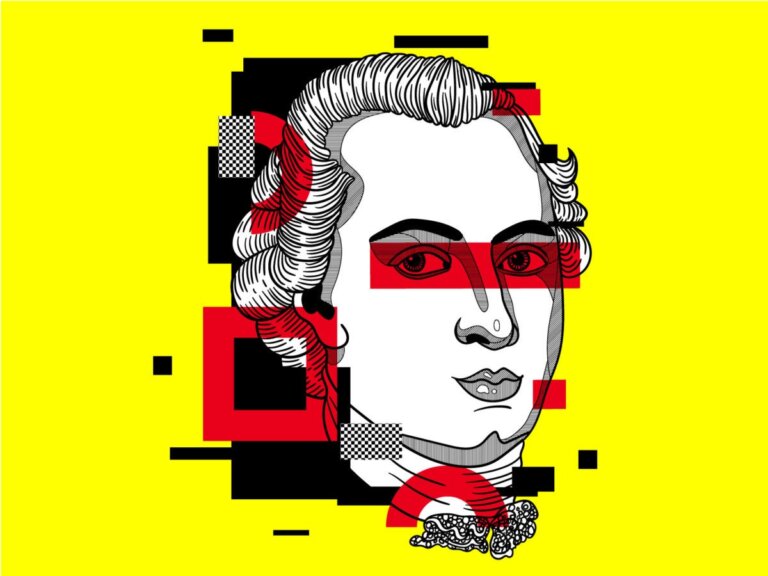Kant's Philosophy: 9 Keys to Understanding His Thought

Immanuel Kant’s philosophy was one of the most influential of the 18th century. His ideology covered many areas of thought in this discipline, including epistemology, ethics, aesthetics, and politics.
However, understanding Kant may be difficult at first, especially because of his strictly philosophical language. Starting from this scenario, we want to propose nine important elements to help you understand the thinking of this intellectual.
Keys to understanding the philosophy of Immanuel Kant
Let’s start by mentioning the three capital works of Immanuel Kant in which a large part of his theory is contained. To understand his thinking, it’s essential to review these theories and present those relevant concepts. Let’s look at the keys below.

1. The most important works of Kantian philosophy
To introduce ourselves to Kant’s philosophy, let’s start with his works. Three of them bring together the synthesis of his doctrine. We’re first of all referring to the Critique of Pure Reason, which was published for the first time in 1781. In this work, Kant seeks to establish the foundations and limits of human reason.
A second work of great importance is the Critique of Practical Reason, published in 1788. It explores what principles our reason must follow in order to carry out moral actions.
The third book that closes Kant’s philosophy is the Critique of Judgment. It was published in 1790 and covers the fundamental problems of human judgments in relation to feeling.
These three works synthesize the thoughts of this philosopher; each one answers a fundamental question. In the case of the Critique of Pure Reason, Kant asks what it is that human beings can know. For its part, the Critique of Practical Reason explores what we should do. And finally, the Critique of Judgment explores what we can expect. This is related to the destiny of human beings.
2. A critical philosophy
From the title of his works, it is possible to infer that Kant’s philosophy is critical. Despite this, he does not use the term criticism in its colloquial sense. Instead, his critical philosophy seeks to find out what reason and understanding can and cannot know on their own.
That is, Kantian critical philosophy seeks to establish the scope and limits of reason independently of external experience.
In this regard, the term criticism refers to a thorough analysis of reason in relation to its own possibilities. So, the three critiques that Kant left us seek to analyze reason in terms of its possibilities of knowledge, practical action, and aesthetic judgments.
3. Phenomenon vs. noumenon
In his search for the limits and possibilities of knowledge, Kant finds an answer in the concepts of phenomenon and noumenon. In this regard, this philosopher maintains that we can know phenomena because our conditions of possibility allow it. However, we can’t account for the noumenon that would be reality itself.
Therefore, the human being, with his knowledge structures, can know objects, that is, phenomena. These are found in sensory experience, and we’re affected by them through our intuition.
The question changes if we want to account for the totality of the objects, that is, the thing in itself, known as noumena. Kant tells us that this transcends the limits of our experience. Therefore, we can’t know it; we only have knowledge of phenomena because our conditions of possibility allow it.
4. Copernican revolution of Kant’s philosophy
Kant’s thought was considered by the philosopher himself as a Copernican revolution. This is to account for the change in philosophical perspective that he introduced with his masterpieces.
This revolution involves the way of considering the relationship between knowledge and objects. Before Kant, knowledge was driven by objects. That is, objects were the source of knowledge. But with his critical doctrine, he reverses these roles.
However, Kant’s philosophy suggests that the source of knowledge is the subject itself in relation to the objects. This means that Kant gives our faculty of thinking an active role through sensitivity and understanding. The first provides us with phenomena to the extent that they affect us. The second imposes categories regarding what comes from outside to organize and systematize the information.
5. Transcendental idealism
Kant’s transcendental idealism maintains that the human subject has a priori structures to know phenomena or objects. A priori means that it’s independent of all experience of the external world. Therefore, they’re pure conditions of knowledge that come with the subject and their reasoning capacity.
These conditions are space and time. This means that they’re forms that human beings impose on objects when they intuit them. Their ideality is that space and time are nothing if we don’t take into account that they’re part of the cognitive structure of the subject. That is, it’s the human being who imposes their structures in order to know. Without this, knowledge isn’t possible.
6. A priori, a posteriori
In the introduction to the Critique of Pure Reason, Kant says that we can’t doubt that knowledge begins in experience. This means that the starting point of all knowledge is experience. But he warns us that we’re not mere experience.
Our own sensitive faculty and understanding are added to that knowledge. In this regard, these faculties are a priori. That is, independent of all experience. For its part, empirical knowledge is a posteriori. This means that they occur in experience.
It must be added that it provides us with the matter, interpreted by Kant as a multiplicity of empirical data. Meanwhile, the a priori form, such as space and time, are conditions of possibility of experience.
7. Kantian ethics
Kant’s ethics are found in two of his works. One of them is called Groundwork of the Metaphysics of Morals (1785) and the other is the aforementioned Critique of Practical Reason (1787). It’s in the latter where the philosopher systematically exposes his ethics of duty, which are also known as deontological ethics.
In this work, Kant states the fundamental principles of action that can be considered morally good. This principle, in accordance with its philosophy, must be universal and valid for all times and places.
Its formulation is known as the categorical imperative or also the moral law. It can be stated as follows: “Act only in accordance with that maxim through which you can at the same time will that it become a universal law.” This imperative responds to a universal ethical principle based on respect for the humanity of others.
Likewise, the categorical imperative suggests that our actions must be governed according to rules that can be applied universally. In this regard, according to Kantian ethics, the answer to the question what should I do? is that our duty is to act rationally according to a universal moral law.
8. Aesthetics
The wide range of topics that Kant’s thought addresses reaches into the field of aesthetics. According to an article published in the Journal of Philosophy, Kant maintains the autonomy of the aesthetic with respect to objectivity. This means that aesthetic judgments come from a subjective feeling, not from a characteristic of things.
Therefore, aesthetics have to do with a feeling that any representation provokes in us. According to Kantian philosophy, aesthetic judgments are universal in nature, and because of this, we all agree with them.
Therefore, beauty is a subjective feeling that isn’t present in objects but in the subject. Once again, Kant shows us the primacy he gives to the rational human being.

9. Kantian humanism
As we explained in previous sections, Kant’s ethics are presented through the categorical imperative. The humanist conception of the philosopher is derived from it, especially through the second formulation of this moral law.
Accordingly, people should be treated as ends in themselves. This means that humanity in general and its individuals shouldn’t be treated as a means. Rather, the value of the human lies in its own humanity, which is interpreted as a demand that Kant imposes on us to respect people.
So, the philosopher invites us not to see others as things or instruments used for our own purposes or desires.
The importance of Kant’s philosophy today
Despite the centuries that separate us from this philosopher, his ideas are still valid today. On the one hand, the critical potential of his philosophy allows us to identify and recognize the limits of our reason and knowledge. Furthermore, it helps us find a middle ground between overconfidence in our rational capacity and, at the same time, not completely renouncing it.
On the other hand, Kant is credited with being the author who shaped human rights. The categorical imperative to respect the dignity of every person is also highlighted.
In this way, Kant’s philosophy represents a universal foundation of the value of dignity embodied in human rights. This, of course, without disregarding his philosophical anthropology that recognizes the human being as a finite and imperfect being.
Finally, Kant’s influence on later discipline was very significant. It had a resurgence in the 20th century in philosophers such as Martin Heidegger, Hannah Arendt, José Ortega y Gasset, Jüger Habermas, Karl-Otto Apel, and Theodor Adorno.
Understanding Kant better
Throughout this article, we’ve explained the keys to understanding Kant. His philosophy, of course, isn’t simple, but we’ve explained the fundamental concepts that contribute to understanding it.
Understanding this thinker is very important to interpreting the development of subsequent philosophy and to give you a more comprehensive and general perspective on human beings and their relationship with others. After all, great ideas transcend the limits of time.
All cited sources were thoroughly reviewed by our team to ensure their quality, reliability, currency, and validity. The bibliography of this article was considered reliable and of academic or scientific accuracy.
- Fianza, K. (2008). La estética de Kant: El arte en El ámbito de lo público. Revista de Filosofía, 64, 49–63. https://www.scielo.cl/scielo.php?script=sci_arttext&pid=S0718-43602008000100004&lng=en&nrm=iso&tlng=en
- Kant, I. (2019). Crítica del discernimiento. Antonio Machado Libros.
- Kant, I. (2020a). Crítica de la razón práctica. Editorial Verbum.
- Kant, I. (2020b). Crítica de la razón pura. Editorial Verbum.
- Willaschek, M. (2022). Razón y realidad. Sobre la actualidad de la filosofía kantiana. Disputatio, 11(22), 149–166. https://studiahumanitatis.eu/ojs/index.php/disputatio/article/view/719
This text is provided for informational purposes only and does not replace consultation with a professional. If in doubt, consult your specialist.








